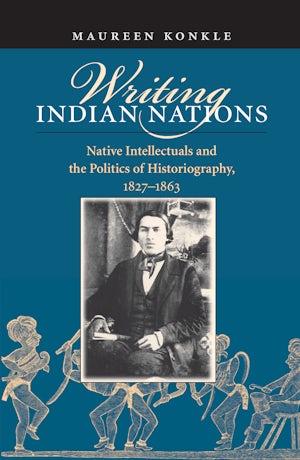Writing Indian Nations
Native Intellectuals and the Politics of Historiography, 1827-1863
By Maureen Konkle
384 pp., 6.125 x 9.25, 18 illus., notes, bibl., index
-
Paperback ISBN: 978-0-8078-5492-1
Published: February 2004 -
E-book EPUB ISBN: 978-0-8078-7590-2
Published: November 2005 -
E-book PDF ISBN: 979-8-8908-7769-7
Published: November 2005
Buy this Book
- Paperback $42.50
- E-Book $29.99
For Professors:
Free E-Exam Copies
As the United States used coerced treaties to remove Native peoples from their lands, a group of Cherokee, Pequot, Ojibwe, Tuscarora, and Seneca writers spoke out. With history, polemic, and personal narrative these writers countered widespread misrepresentations about Native peoples' supposedly primitive nature, their inherent inability to form governments, and their impending disappearance. Furthermore, they contended that arguments about racial difference merely justified oppression and dispossession; deriding these arguments as willful attempts to evade the true meanings and implications of the treaties, the writers insisted on recognition of Native peoples' political autonomy and human equality. Konkle demonstrates that these struggles over the meaning of U.S.-Native treaties in the early nineteenth century led to the emergence of the first substantial body of Native writing in English and, as she shows, the effects of the struggle over the political status of Native peoples remain embedded in contemporary scholarship.
About the Author
Maureen Konkle is associate professor of English at the University of Missouri-Columbia.
For more information about Maureen Konkle, visit
the
Author
Page.
Reviews
"An important contribution to the scholarship on nineteenth-century Native literature."--Early American Literature
"An extraordinary book."--Western American Literature
"A much-needed volume on Native American history. . . . This book should . . . come as a clarion call to those of us who research Native American history. The concept of 'nation' is not wholly cultural--it is political, and an emphasis on the former at the expense of the latter elides vital bases for Native American political sovereignty. Writing Indian Nations serves as a much needed reminder that this remains as true today as it was in the nineteenth century."--Western Historical Quarterly
"Makes a significant and welcome contribution to the growing body of scholarly work dedicated to the retrieval of the more obscure early writings [of American Indian intellectuals and activists]."--American Historical Review
"This compelling book . . . sets forth a cohesive multitribal history of Native writing. . . . [An] invaluable contribution. . . . Konkle's scholarship is first-rate, grounded in comprehensive archival research yet not in the least insulated from real-world politics and pedagogies."--American Literature
"Konkle challenges readers to reexamine both the writing of Native intellectuals and the critical frameworks--including her own--that have guided their interpretation."--NC Historical Review




